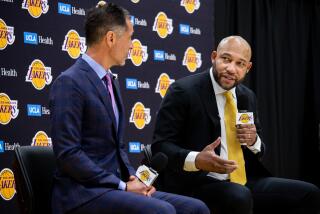SOUTHERN CALIFORNIA CAREERS : MAKING IT WORK : Being Part of the Team at Work
- Share via
To listen to executive recruiters and other employment trend specialists these days, the corporate hotshot, so sought-after in the me-decade of the ‘80s, is a has-been. Now employers want team players, people willing to join with their colleagues in collaborative--not competitive--efforts aimed at achieving shared goals, workers who genuinely believe that the whole is greater than the sum of its parts.
Says Gary Kaplan, owner of a Pasadena executive recruiting firm: “The single-combat warrior, that bright, purposeful worker, tends to suck up a lot of oxygen in an organization. And now they’re often seen as too innovative and too difficult.”
The switch follows more than five years of intense thinning of management ranks throughout Corporate America that has left businesses with flattened organizational ties that many experts say require greater cooperation and productivity among remaining managers and workers.
Companies also view the teamwork system as a way of getting employees to think and act as though they are the owners of the business with a vested stake in its performance beyond a regular paycheck.
So, what does it take to become a team player?
For starters, says Marilyn Moats Kennedy of Career Strategies in Wilmette, Ill., you must suspend your innate disbelief that this concept can succeed. “You’ve got to believe that it’s going to work; that’s 80% of it,” she says.
However, she readily admits that because many companies pay only lip service to the true value of teamwork--shared goals, cooperative efforts and direct responsibility for results--workers generally view the notion with cynicism and refuse to give it a fair chance of success.
“Teamwork is all too often a catch phrase used to demand loyalty from workers to their organization and boss,” Kaplan complains. Even worse, he adds, the concept is also subject to becoming a mask for indecision, procrastination and lack of management leadership.
If you can accept the possibility that teamwork can work, Kennedy says employees must remain focused on the goal the team has set for itself and flexible about the various approaches and working styles of their colleagues.
Selecting the team’s goal and strategies for achieving it can be the most important--and difficult--task facing a group of employees. Potential problems include trying to figure out management’s desired results rather than exploring the full range of actions, as well as failure to allow a team to develop its own guidance and tempo.
“Teams require great management at the very top,” Kennedy says. “It’s no surprise that college sports coaches are paid as much or more than college presidents. Developing a cohesive, winning team is three times more difficult than issuing orders.”
Personality issues, she argues, are largely irrelevant if employees share common goals.
“The best team players in sports--men like (former Chicago Bulls basketball player) Michael Jordan and (former Chicago Bears quarterback) Jim McMahon are hardly men without intense personalities and strong skills,” she notes. “But when they’re working, they are entirely dedicated to the team’s goal and anything else is irrelevant. That’s how it should be in business, too.”
Still, some personality types are not well-suited to teamwork.
“Cutting an organization down to a core group that can manage through tough business cycles places a premium on getting people who can work together to get the job done,” says John A. Challenger, executive vice president of Challenger, Gray & Christmas Inc., a Chicago-based job-search firm.
Challenger believes that with only limited exceptions, any worker, no matter how independent, self-centered or inwardly focused, can become a team player. Those who need not apply?
“Complacent people, people who are adverse to action,” he responds.
Other experts put risk-adverse and perfectionist personalities on the short list of workers generally unsuited to teamwork.
Charlene Walker of Womens Focus/Career Focus in Tustin says flexibility toward colleagues and their opinions and habits is perhaps the most important attribute a worker can bring to a team.
“You’ve got to buy into the notion that there is an advantage and an adventure to working as a team,” she explains. “And you’ve got to believe that you are all in this together--and for the better.”
Are You a Team Player?
Take the following quick test to determine whether you have the temperament to work in groups.
1. People say I’m impatient.
a. False
b. True
c. Uncertain
2. I find myself upset rather than helped by the kind of criticism that many people offer me.
a. Occasionally
b. Often
c. Never
3. I work best when:
a. I receive recognition and appreciation for my ideas.
b. I know that I did a good job. Self-approval is all I need.
c. Uncertain.
4. If I had to choose, I would rather:
a. Work with others and follow group consensus.
b. Work alone with full responsibility for the outcome.
c. Seek advice only when I want it.
5. In a group, I prefer:
a. To share my ideas regardless of who gets the attention.
b. To take a back seat and listen.
c. To impress everyone with my knowledge.
Scoring: If you picked four or five “a” answers, you are probably a good team player, says Charlene Walker, of Womens Focus/Career Focus, a Tustin career development and job placement firm. If you answered fewer than that, consider work environments with different management styles.
Group-oriented people, Walker says, depend on social approval and admiration. They tend to ask others for help easily, prefer not to make independent decisions and are flexible with their ideas. Equally important, she adds, they are open to criticism.
Source: Womens Focus/Career Focus
More to Read
Inside the business of entertainment
The Wide Shot brings you news, analysis and insights on everything from streaming wars to production — and what it all means for the future.
You may occasionally receive promotional content from the Los Angeles Times.









